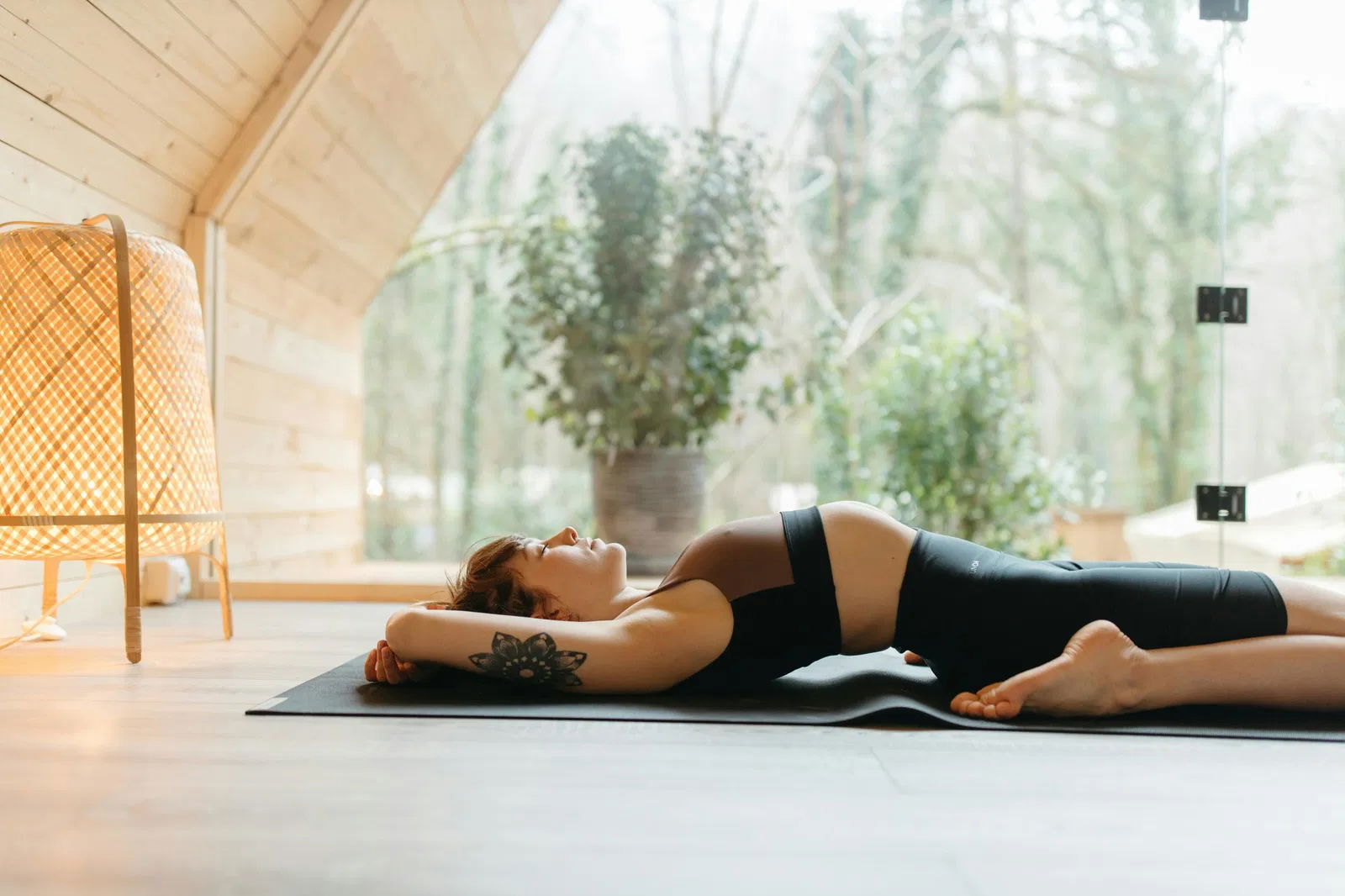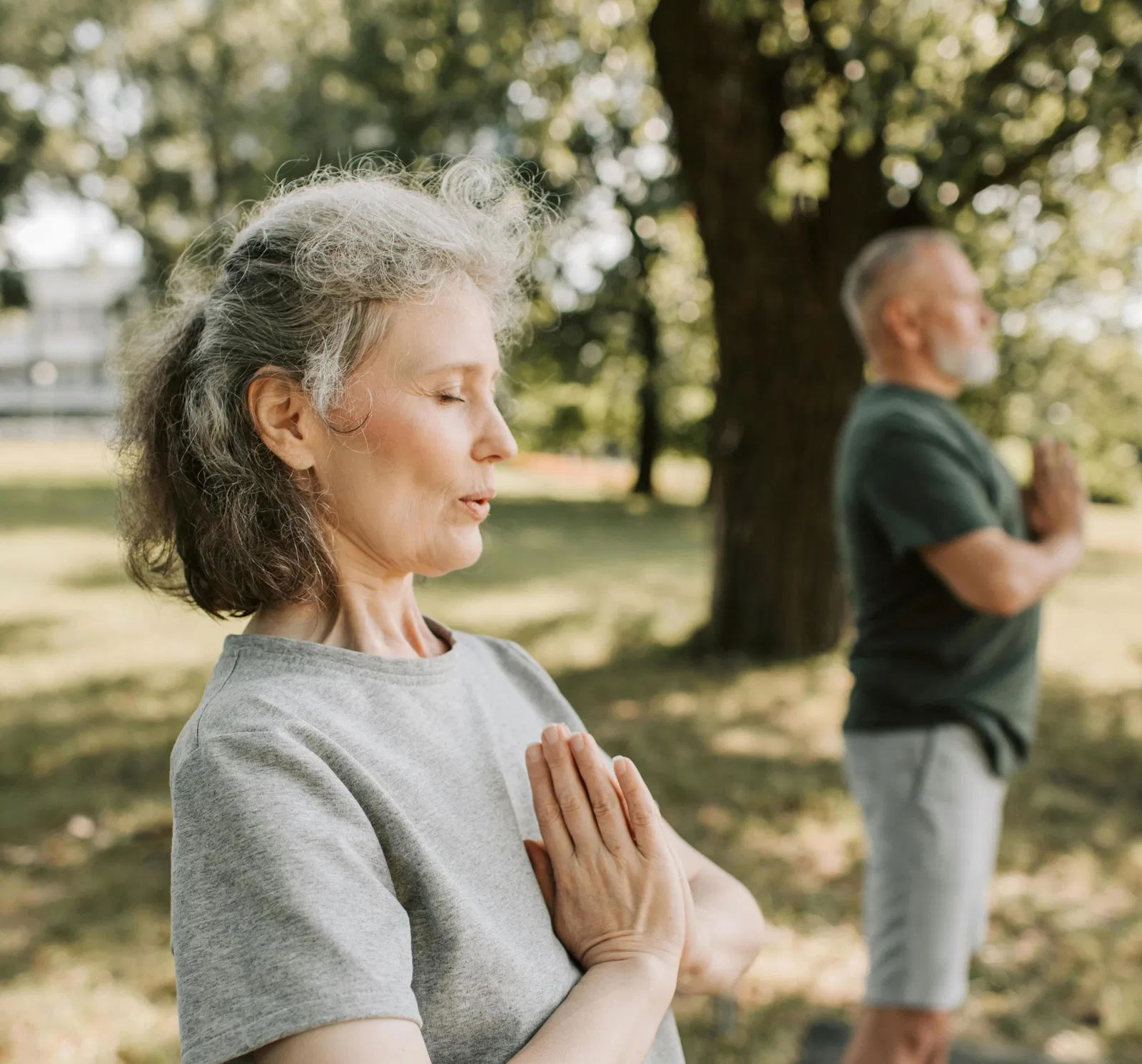Healthy eating is probably the first thing that comes to mind when you think of strengthening your immune system. But did you know that there are numerous other ways you can strengthen your immune system? Not just by choosing the right foods, but also through breathing and meditation, you can influence your immune system.
How to strengthen your immune system with breathing and meditation

3 breathing exercises to strengthen immune system
By experimenting with the following three breathing exercises, you will find out which way of conscious breathing feels fine for you. Although breathing exercises have many health benefits, they are not suitable for everyone. If you have a particular medical condition or are on medication, it is wise to discuss this with your doctor first.
Should you feel dizziness or tingling in your hands, arms, feet or legs, it is wise to take a break or stop altogether.
1. Abdominal breathing
Breathing with your abdomen helps you use the diaphragm correctly. You may get tired of this exercise because you are tightening several muscles at once, but practicing more often will make it easier. For best results, do this exercise for 5 to 10 minutes, 3 to 4 times a day.
- Lie on your back with your knees slightly bent and your head on a pillow. Place another pillow under your knees for support.
- Place one hand above your chest and one hand under your rib cage so you can feel the movement of your diaphragm.
- Breathe in slowly through your nose and feel your stomach press into your hand.
- Keep your other hand as still as possible.
- Exhale with your lips pursed as you tighten your abdominal muscles and keep your upper hand completely still.
When you have mastered abdominal breathing lying down, you can try it sitting on a chair. Then you can apply this technique while doing your daily tasks such as washing dishes or cooking.
2. Alternating nasal breathing
This breathing technique is a yoga breath control exercise. Alternating nasal breathing is a simple but powerful technique that regulates the mind, body and emotions. It lowers the heart rate and reduces the risk of cardiovascular disease.
- Sit in a comfortable position.
- Lift your right hand toward your nose, pressing your index and middle fingers down toward your palm.
- After an exhale, use your right thumb to gently press your right nostril closed.
- Breathe through your left nostril, then close your left nostril with your right pinky and ring finger.
- Release your thumb and breathe through your right nostril.
- Inhale through your right nostril and then close it.
- Release your fingers to open your left nostril and exhale through this side.
This is one cycle. Continue this breathing pattern for up to five minutes keeping your breath even.End your session by exhaling on the right side.
3. Equal Breathing
This breathing technique ensures that your inhale and exhale are of equal length. Find a breath length that falls between easy and difficult. Usually this is between three and five counts. Once you get used to this seated breathing technique, you can incorporate it into your daily activities. For example, when you are walking or standing in line.
- Sit comfortably.
- Breathe in and out through your nose.
- Count during each inhale and exhale and adjust the rhythm to make sure both breaths end up being the same length.
- You can also choose a mantra or phrase to repeat during each inhale and exhale instead of counting. For example, "Sat Nam," which means "truth is my name. You then inhale on 'Sat' and exhale on 'Nam'.
- You can take a short pause after each exhalation if this feels comfortable.
- Repeat for at least five minutes.
The above breathing exercises give your immune system a boost, but also work to relax. By applying these techniques in your daily life, you will learn to deal with stressful situations and relax more easily. Want to experiment further with different breathing techniques? Then check out the fine exercises in the Meditation Moments app.
What is the immune system?
The immune system is a defense system that cleans up pathogens and protects your body from infections. If your immune system is not functioning optimally, you are more likely to get sick.
There are several factors that cause your immune system to deteriorate, such as age and being overweight. For example, older people and overweight people are more susceptible to disease.
But you can also have a weakened immune system due to stress. When we are stressed, the immune system's ability to fight bacteria and viruses is reduced. This makes you more susceptible to infections.
How does the immune system work?
But how exactly does the immune system work? When your body perceives foreign substances (antigens), the immune system steps in to recognize and repel these antigens. B cells (lymphocytes that play an important role in the immune system) are then triggered to make antibodies. These antibodies are also called immunoglobulins and attach to specific antigens. After they are made, antibodies usually stay in our bodies in case they need to fight the same antigens again. This is why you don't easily get sick twice from an illness.
What is the effect of breathing on the immune system?
Breathing is not something we think about every day, and yet it is the basis of several forms of yoga, meditation and mindfulness. Breathing in a conscious way (also called "breathwork") provides immediate physical, emotional and cognitive benefits.
But breathwork also has long-term benefits. Breathing exercises create a sense of calm, which has positive effects on our immune system, our telomeres (protect your DNA) and our physiology. Chronic stress can cause exhaustion. Breathwork helps you relax to regain balance.
The name actually gives it away a bit: conscious breathing means being aware of how you breathe in and out. You probably learned in school earlier that the lungs absorb oxygen and release carbon dioxide. But beyond that, the mechanics of breathing, the role of the diaphragm and the lymphatic flow created by deep breathing are unknown to most people.
The effect of stress on the immune system
Conscious breathing regulates our stress response. When we experience stress, our immune system is suppressed. Scientifically, this is because stress reduces the number of lymphocytes (the white blood cells that help fight infection) in our bodies. The fewer lymphocytes, the more susceptible you are to colds and other diseases.
So simply put, more stress makes for a worse immune system. By consciously breathing, we can reduce our stress response, getting out of fight-or-flight mode.
What about meditation and the immune system?
Breathing well is important in any form of meditation. Many people also like to focus on breathing while meditating. By consciously breathing, you calm your body and enter a state of relaxation.
In addition, observing the breath during a meditation causes us to synchronize our body and mind. This brings us more into the here and now and reduces our stress response. So meditation reduces stress. And what is the result of less stress? A better immune system.
It is recommended that you breathe naturally when you meditate. So this can be shallow, or it can be a little deeper - depending on how you breathe normally. Some people like to start their meditation with 3 deep breaths, but this is not necessary. Just do what you feel comfortable with.
Meditation for weakened immune system due to stress
There are also meditations specifically designed to boost your immune system. These focus on reducing stress so you become more relaxed. For example, in the Meditation Moments app you will find the meditation "Anti stress breathing. This will reduce your stress level in just a few minutes. By doing this meditation regularly, you strengthen your immune system in a natural way.
You can make several lifestyle changes to strengthen your immune system, such as healthy eating, meditation, breathing and controlling your stress levels. And while none of these ways can completely prevent disease, they can help you become more resistant to it.



















